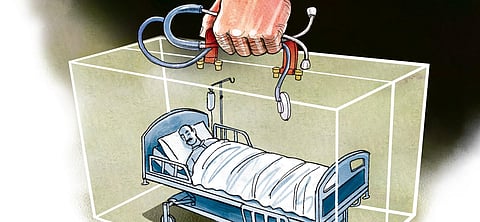

HYDERABAD: Post-discharge care is key to a patient’s health and improves their outcomes. In clinical terms, post-discharge care refers to the care and support that patients receive after they have been discharged from a hospital or other healthcare facility. “This care is often essential to ensure that patients are able to recover fully from their illness, surgery or injury and to prevent readmission to the hospital. Additionally, it helps to avoid unwanted outcomes; for this reason, healthcare providers should follow up with patients after discharge,” says Dr Suman Katragadda, CEO & Founder of Heaps Health, further adding, “As an example, suppose a person underwent a knee replacement procedure.
During the first week following discharge, the patient should be on the lookout for any complications, including swelling at the site of the incision and some form of redness or soreness. In the second week, some patients might experience complications such as deep vein thrombosis (DVT), which could result in a stroke if left untreated. This is where the role of post-discharge care becomes important.”
There are several ways that post-discharge care could be a game-changer in 2023 and beyond. Some potential approaches include
Care coordination
In a study conducted by the National Health Authority (NHA), two indicators of quality care under the Ayushman Bharat-Pradhan Mantri Jan Arogya Yojna (AB-PMJAY) were unplanned readmissions and hospital mortality. A study found that approximately one in twenty patients discharged from PMJAY were readmitted within 30 days and one in fifty were readmitted within seven days of discharge. In order to avoid such conditions, we require care coordination, which is the process of coordinating the care and services provided by different healthcare providers to ensure that the patient receives the most appropriate and effective care available. This can involve coordinating care with the patient’s primary care physician, specialists, and other healthcare providers such as therapists, and other support staff.
Improved patient outcomes
By providing follow-up care, healthcare providers can help to ensure that patients continue to receive the support they need to recover and maintain their health after leaving the hospital. This can lead to improved patient outcomes, including reduced readmission rates, fewer complications, and better overall health.
Enhanced patient satisfaction
Healthcare organisations should aim to improve the satisfaction of their patients after discharge since patient satisfaction is a valuable indicator of the quality of care and can impact outcomes and costs. Therefore, it is important for healthcare organisations to focus on patient satisfaction as a key component of their care delivery model. There are many strategies that healthcare organisations can use to enhance patient satisfaction after discharge, including providing clear and comprehensive discharge instructions, coordinating follow-up care, responding to patient concerns and questions, and seeking patient feedback.
Use of technology:
Using technology, such as monitoring systems, may help healthcare providers monitor patients’ progress and make timely interventions if necessary following discharge, ensuring patients receive the care they need to fully recover.
Creating value-based care networks
Insurance companies typically have a strong interest in ensuring that their policyholders receive high-quality medical care while they are in the hospital. Insurance companies may also work with hospitals to encourage the use of evidence-based practices and protocols for post-discharge care. This can help to ensure that patients receive consistent, high-quality care after they leave the hospital and can help to prevent readmissions and other costly complications.
Overall, post-discharge care has the potential to be a game-changer in 2023 and beyond due to its potential to improve patient outcomes, increase patient satisfaction, reduce the risk of patient death, and provide patients with timely access to care.